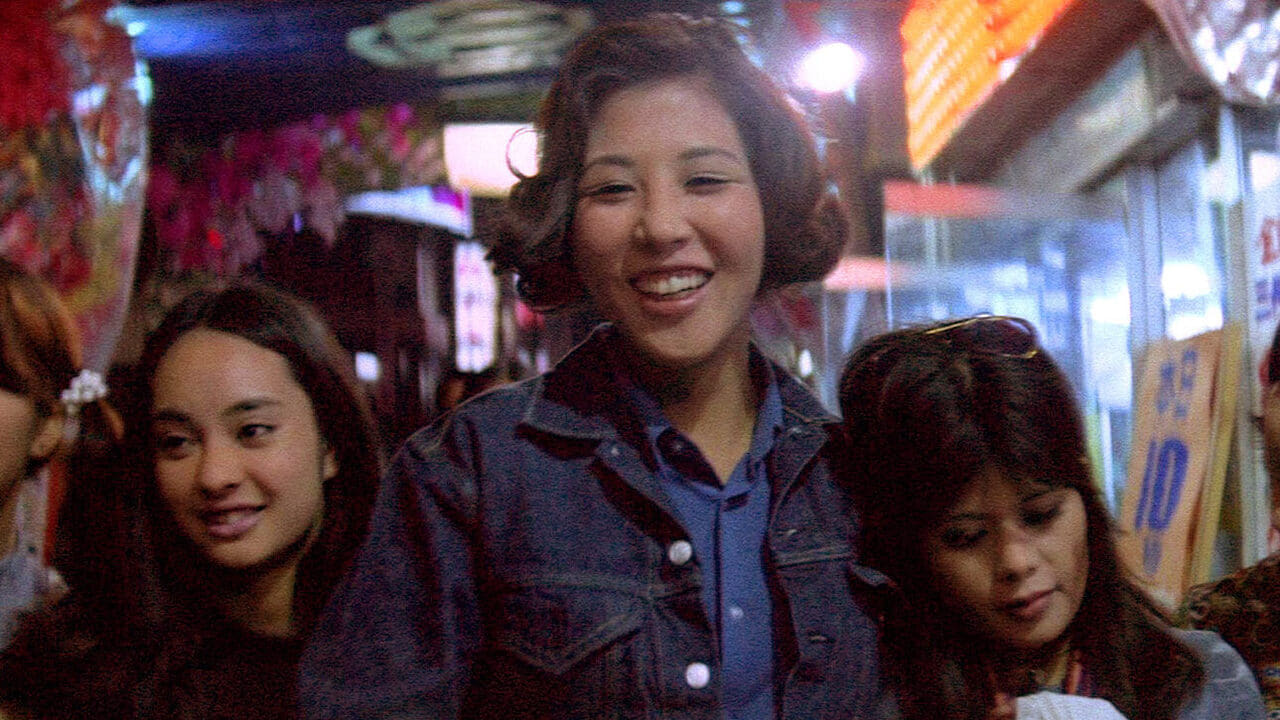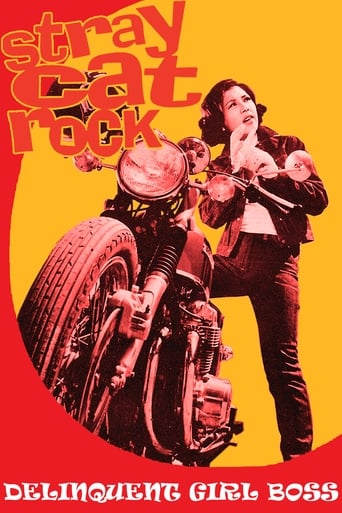

The first of the Stray Cat Rock films is not as good as its first two follow-ups, Wild Jumbo and Sex Hunter, but it's a solid girl gang flick. Meiko Kaji stars as the leader of the Stray Cats, as she will tend to do, but Akiko Wada probably has more screen presence in this one as the new girl on the scene, a motorcycle chick who is generally assumed to be a dude until she takes off her helmet (one particular extra has a great double take as she walks out of the women's bathroom). When Kaji's boyfriend (Koji Wada) double-crosses the yakuza, it's up to the Stray Cats to save him - which means now they have also double-crossed the yakuza. Tatsuya Fuji plays one of the main gangsters. There are plenty of cool musical performances and lots of great views of a swinging 1970 Tokyo. The film is shot almost entirely with hand-held cameras, which puts you right in the action. The film mostly takes place at night and indoors, so the film is a bit darker than the two follow-ups. It also moves a tad more slowly. Still very much worth seeing, though.
... View MoreIn the first of what would become a successful five-film series, Stray Cat Rock: Delinquent Girl Boss is a passable and sporadically entertaining introduction to the 'girl gang' genre and one of the key entries in a series of films known as 'pinky violence'. Anchored by a performance of undeniable presence by Akiko Wada, who plays a no- nonsense biker and who surprisingly didn't appear in any of the sequels, the film gets bogged down by a plodding series of events and set-pieces that are too free-spirited for it's own good, and lingers far too long on various pop performances from flavour-of-the-week bands.Plot-wise, the film doesn't have much going for it. Ako (Wada) is a drifter who picks up Mei (Meiko Kaji - later to play the eponymous Lady Snowblood (1973)), who is caught up in a beef with a rival girl gang. A fight ensues, and Ako chases away the gang and the various yakuza that have gathered for the entertainment. It becomes apparent that Mei's boyfriend Michio (Koji Wada) is caught up in a plot with the Seiyu Group, a powerful Yakuza organisation, to throw a boxing match. Naturally, things don't go quite to plan and Michio is hunted by the Seiyu Group, but not if Ako has anything to say about it.Visually, the film is often splendid, using ultra-chic locations, split- screens and obscure camera angles that give it a trippy aesthetic. It's colourful yet undeniably grim, encapsulating the rebellious hippy spirit that undoubtedly made it's way over from America in the late 1960's. Reversing the usual gender roles, the Stray Cat girls are a rather repulsive lot, even though they plays our heroes, and Ako especially berates men for being weak if they refuse to stand up and fight, even when one is beaten to a pulp during a boxing match. It's certainly interesting thematically, but as a piece of entertainment, it's often extremely dull, stretching out it's wafer-thin plot when it should be giving us girls kicking ass.www.the-wrath-of-blog.blogspot.com
... View MoreThe first part of the Nora-neko rokku ("Alley Cat Rock") series was originally Nikkatsu Studios' answer to the rivaling Toei Studios' Delinquent Boss series, but spawned four sequels thanks to its popularity. I haven't seen any of the entries in the Toei series, so I don't know how the Nora-nekos do in comparison, but in their own right all five of them are very entertaining bad girl movies.Onna banchô, the first movie in the series, takes place in Shinjuku, Tokyo where rivaling youth gangs are constantly trying to one-up each other in toughness. An all-girl gang led by Mei (Meiko Kaji) gets involved in dangerous circles when Mei's boyfriend Michio (Kôji Wada), wants to join a powerful yakuza organization called Seiyu but inadvertently loses the gangsters' money in a fixed boxing match. Of course, Mei's gang is not going to leave him to the gangsters, especially when helped by an enigmatic and independent female biker called Ako (Akiko Wada).The film is known for its visual look that captures the spirit of the era pretty neatly. Many scenes take place in a psychedelic rock club with colourful lights and bands performing psych-rock, soft schlagers and folky guitar ditties. The non-diegetic score is totally groovy too, as are Akiko Wada's song scenes, be they related to the plot or not – the movie was the film debut of the deep-voiced singer of Korean heritage, so I guess some singing was to be expected. The downside of the ultra-cool atmosphere is that at many points the screen looks way too dark, making it difficult to see what exactly is happening (or perhaps it was just my old television set). What I appreciated about Yasuharu Hasebe's direction is that he keeps camera trickery (weird angles, quick zooms, filters) under control, only using special techniques moderately and not in an overly distracting manner.The plot itself takes place within less than two days and involves many fights, chase scenes and tough talking, staying quite entertaining for the shortish runtime. The street fighting may not look as tight as actual martial arts flicks, but does its part alright. Some of the torture scenes look a bit nasty, especially the blow torch part, but overall the mood stays pretty light compared to some real exploitation sleazies. One of the best scenes is definitely the big chase between Ako's motorcycle and the roofless "Fellow Buggy" of the yakuza underboss Katsuya (Tatsuya Fuji) that is not stopped by narrow tunnels, shopping malls or even staircases, either descending or ascending.Looking behind the first-hand crime plot, there is a strong feminist undercurrent in the film and the portrayal of the girl gang members' friendship is one of the most important themes. I would not call the movie the strongest of character dramas out there, but at least the charismatic Akiko Wada carries her scenes at ease (too bad she doesn't appear in the sequels). I also liked the self-confident performance of Tatsuya Fuji who is probably best known for playing the lead part in Nagisa Ôshima's controversial sexual drama In the Realm of the Senses a few years later.I am far from well-versed in Japanese youth gang movies, but I think Stray Cat Rock is certainly entertaining enough to be recommended to anyone who is interested in the genre. The sequels are worth seeing too if you like the first one, but Delinquent Girl Boss (or whatever its correct English title is) may be the best starting place to the series after all, even though the movies are not really connected in terms of plot. A fun flick, in any case.
... View MoreThis minor exploitation film about a gang of female delinquents struck a chord with young Japanese audience and spawned a rapid-fire string of sequels. Today it sticks out for two interesting reasons. The first one is certainly not the plot, a run of the mill twaddle about a fixed boxing match that simply serves as an excuse for generic car chases, fights, cheap sadism (e.g. a woman's breasts getting scorched with a blowtorch) and very brief flashes of female nudity.Rather it is the way the women are given a much more central and active role than was usual at the time, certainly more so than in European or American productions. Initially their aggressiveness and fighting over turf just appear as copped attitudes to titillate the audience, amusing cat-fighting that the male villains watch with sneering delight. But the gang disrupt the expectations, refusing to be contained and holding their own even after the gloves have come off. Thus the final confrontation is between the female gang-leader and the now-disgraced head thug. Meanwhile, the fashionably pacifist males get scorned for being wimps who don't have the guts to help the women save their mate from trouble. The setting and attitudes are Neolithic, but the players are set up slightly different from what you would have expected in 1970.The main focus of this tentative feminist reshuffling of roles is the biker character played by the tall, husky-voiced singer Akiko Wada. She rides in to the picture like a modern-day ronin on a motorbike, half-reluctantly ends up leading one female gang against the male criminal syndicate who back their rival gang and finally rides off in the good old Western tradition, without really revealing anything about herself. She takes the traditional active leader and fighter role, without having to rely on a boyfriend or another man in a tight spot (that's more the role reserved to Meiko Kaji's character). And yet left alone she gets to look longingly at a shop window full of frocks and sing a wistful ditty about how a woman is not a man but sometimes just has to put her life on the line! It's all so calculated, but also so earnest that you can't help liking it.This brings us to the second reason for watching this: the soundtrack has plenty of charmingly dated musical action, from fuzz guitar-driven psychedelic rock to jazzy pop, usually performed in the club that serves as an oasis and a bolt-hole for the gang amidst all the action. In addition to Wada's gutsy performances, the film sets the precedent for the sequels by having some flavour-of-the-month performers strut their musical stuff for the camera, which captures everything with energetic flair.It's this combination of somewhat humorous period pop-trashiness and the earnest grappling with the underlying norms of the day that makes this film a rather charming one-time watch, but doesn't really warrant more than that.The charm is much thinner on the ground in the sequels. Wairudo janbo's semi-comical caper plot or Sekkusu hanta's racially and nationalistically motivated string of beatings, shootings and attempted rapes that pass for one, don't hold up on their own, the music gets more vapid by the film and the women are more and more relegated to objects for men to violate or to fight over. Touchy themes (e.g. racism and the generation gap) are again brought up and there is often delightful comedic interaction and rapport going on between various characters portrayed by the recurring cast (particularly in Bôsô shudan '71 where the merry gang of delinquents are portrayed as a violent hippy collective). Yet the films usually can't do much with their ideas. Instead they listlessly glide along the prefabricated exploitation groove and then collapse haphazardly into obligatory shootouts and downbeat auto-destruction, with perhaps only Mashin animaru hinting at some hope among the ruins.Wada doesn't appear in the sequels (apart from a minute of recycled footage in Wairudo janbo). Instead the series became a breakthrough for Kaji, whose defiant poses and stoic independence remained the same from film to film, regardless of the character she was playing at the time.
... View More